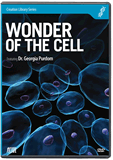
Laminin and the Cross
Is There a Connection?
Abstract
Much has been made of laminin having a cross shape. But should we look for such “signs” to prove the accuracy of God’s Word?
Keywords: laminin, cross, Christianity, icon, molecules, biology, extracellular matrix, ECM, cells, truth, Jesus Christ, signs, God's Word
Over the past few months we have received numerous questions concerning a popular Christian icon—the protein laminin. Laminin, interestingly, is in the shape of a cross (see here). In fact, a quick Internet search turns up multiple websites selling T-shirts, mousepads, stickers, coffee mugs, and a host of other items with a picture of the laminin protein. These items usually include a catch phrase such as “Great designers always leave their mark” or “Fingerprint of The Creator.” As a molecular biologist, I can certainly appreciate excitement concerning a protein (which really shows what a science nerd I am!), but a protein as an icon of Christianity?
What Is Laminin?
Laminin is a protein that is part of the extracellular matrix in humans and animals. The extracellular matrix (ECM) lies outside of cells and provides support and attachment for cells inside organs (along with many other functions). Laminin has “arms” that associate with other laminin molecules to form sheets and bind to cells. Laminin and other ECM proteins essentially “glue” the cells (such as those lining the stomach and intestines) to a foundation of connective tissue. This keeps the cells in place and allows them to function properly. The structure of laminin is very important for its function (as is true for all proteins). One type of congenital muscular dystrophy results from defects in laminin.
How Has Laminin Become an Icon of Christianity?

An argument that has become quite common in modern Christianity is well illustrated by relation of the structure and function of laminin to biblical truths. This little, unknown protein became popular after it was used in a sermon. The topic of laminin quickly appeared in many emails and blogs, and eventually its shape made its way into merchandising (e.g., T-shirts and coffee mugs).
In a sermon, Louie Giglio asks how we can know that God will hold us together (which he infers from Psalm 33). He states, “That’s really what we want to know today, and I’ll tell you how you can know today that God will always hold you together, no matter what.” Mr. Giglio then discusses the function of laminin (as glue), and its structure (a cross) in the body. He relates this to Colossians 1:17, which states, “He [Christ] is before all things, and in him all things hold together.” His argument is basically that God designed laminin in the shape of a cross and gave it the particular function of “glue” in the body so that we can know (in his words) the truth that Christ holds all things together.
What Is the Problem with This Type of Argument?
While I appreciate Mr. Giglio’s passion for the Word, I would suggest that this type of argument is not a good one to use. (See God’s Pharmacy for a similar example.) The main problem with this type of argument is that it appears that something outside of Scripture (in this case, laminin) is vital to know the truthfulness of a biblical truth. Laminin is used to prove a biblical truth. However, we should never use our fallible, finite understanding of the world to judge the infallible Word of God. What we observe in the world can certainly be used to confirm God’s Word (and it does), but our finite observations are not in a position to evaluate the infinite things of God. Only if we start with the Bible as our ultimate standard can we have a worldview that is rational and makes sense of the evidence (see “Atheism: An Irrational Worldview” and “Evolution: The Anti-Science”).
The structure of laminin was not made popular until 2008, yet I have no doubt that many Christians before that time have trusted the truth presented in Colossians 1:17 because it is God’s Word. Would Colossians 1:17 be any less true if laminin were not in the shape of a cross? No. If five years from now we discover that the laminin protein actually has a different shape (in fact, some electron micrographs of the protein do not resemble a cross at all, see here, p. 149), would that change the truth found in Colossians 1:17? No, because our belief in the truthfulness that Christ holds all things together should start and end with God’s Word alone!
Looking for Signs
Unfortunately this type of argument—which effectively treats our fallible, finite knowledge of the evidence as superior to God’s Word—is very popular in today’s society, especially among young people. As a former Christian college professor, I have a lot of experience with college students. I lost track of the number of times students came into my office and told me they were going to switch majors or date someone or decide to do something because God had given them a “sign.” I always posed a series of questions to them after hearing about their “sign”: Had they been praying and asking for God’s guidance? Had they been studying the Bible? Had they been talking with spiritually mature mentors? Usually this was met with a half-hearted “yes,” and then it was back to telling me about the amazing “sign.”
Certainly God can use signs to reveal things, and that is evident from Scripture. In Luke 2:12 an angel tells the shepherds, “This will be a sign to you: You will find a baby wrapped in cloths and lying in a manger.” However, Jesus also admonishes those that improperly seek signs (Matthew 16:4). In today’s “fast food” society, many people prefer the “drive-thru” when it comes to knowing God’s truths. A sign is much quicker than studying and reasoning from the Scriptures, taking the time to pray, and discussing God’s Word with other believers.
Young Christians have started doubting God’s Word (especially the book of Genesis) because this is what is drummed into them from the secular world through much of the media and most public schools. Many desperately want to accept the claims of Scripture but have been taught to think, improperly, that the unaided mind is the ultimate standard for acquiring knowledge. That is why the type of argument used with the laminin protein likely resonates with them and many other Christians as well. As one blogger said, “I Believe God Is Sending Us A Message Saying Im [sic] Here And Im [sic] Holding You Together.” Yet Proverbs 1:7a tells us, “The fear of the Lord is the beginning of knowledge” (see also Colossians 2:3).
Consider what happens when people try to prove the resurrection of Christ (a biblical truth) using unaided reasoning. Science is clear on this one: dead people do not come back to life. So, does that prove that Jesus did not resurrect? Of course not! Science and human reasoning are not the limit of what is possible; God is the limit. Scripture should be our ultimate standard to understand this miraculous event.
Starting with unaided reasoning and reading our own ideas into the Bible can lead us to all sorts of absurd conclusions. For example, the Ebola virus, which causes a horrific form of hemorrhagic fever that usually results in death, happens to have the structure of what is commonly referred to as a shepherd’s crook. The Bible tells us that Jesus is the Good Shepherd (John 10:14). So, if the shape of laminin supports the biblical truth that Christ holds all things together, then what would we conclude about the Good Shepherd from the shape of the Ebola virus? And if laminin can represent a cross, then why not a sword (Ephesians 6:17; Hebrews 4:12)? As Christians, we cannot allow our fallible, finite interpretations to supersede the Word of God (2 Peter 1:20).
Conclusion
Romans 1:20 makes it clear that we can know God through what He has made. God certainly designed the laminin protein and gave it a structure that allows it to perform the function He designated for it. In fact, one of the early papers on the structure and function of laminin said this: “Globular and rodlike domains are arranged in an extended four-armed, cruciform shape that is well suited for mediating between distant sites on cells and other components of the extracellular matrix” (emphasis mine).1
The supremacy of Christ that is talked about in Colossians 1:15–20 is probably one of my favorite passages in all of Scripture. Paul begins talking about Christ as Creator and moves to Christ as Redeemer. These are truths not because they appeal to our unaided reasoning, but because they are revealed in God’s Word.
Footnotes
- K. Beck, I. Hunter, and J. Engel, “Structure and Function of Laminin: Anatomy of a Multidomain Glycoprotein,” The FASEB Journal 4 (1990): 148–160, doi:10.1096/fasebj.4.2.2404817.
Recommended Resources

Answers in Genesis is an apologetics ministry, dedicated to helping Christians defend their faith and proclaim the good news of Jesus Christ.
- Customer Service 800.778.3390
- © 2024 Answers in Genesis



